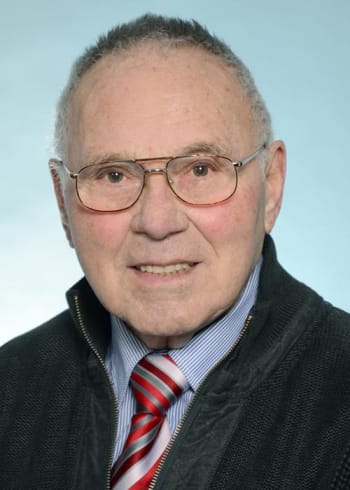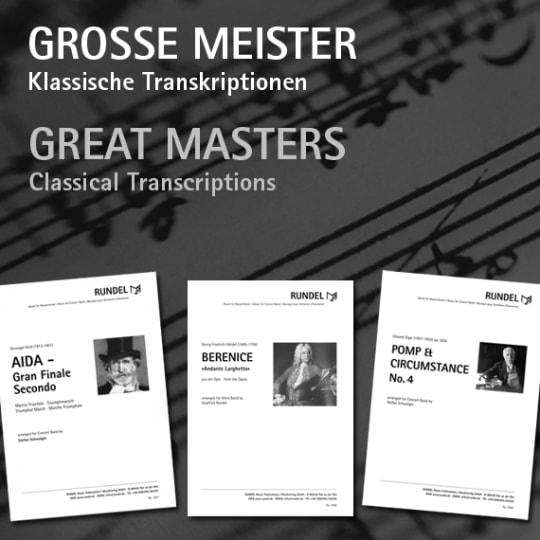Rundel Video: Akademische Festouvertüre - c-Moll op.80 | Media center
HomepageMedia centerRundel Video: Akademische Festouvertüre - c-Moll op.80
This Media Center item can only be displayed if you agree to the use of marketing cookies. With one click you can accept it.
Akademische Festouvertüre - c-Moll op.80
Info
Notes available at:
https://www.rundel.de/en/
Academic Festival Overture
Ouverture pour une Fête Académique
The composer Johannes Brahms was born into a family of musicians from Hamburg. His father was a simple tavern musician who, by his great diligence, worked his way up to become a respected double bass player at the City Theatre. Apart from his father’s musical encouragement, Brahms gained a thorough musical education from Eduard Marxsen (1806-1887). His eminent musical skill and early maturity as a pianist soon brought him considerable concert activity in Hamburg and other cities, giving him confidence on stage and before audiences even as a young man.
Together with the violinist Eduard Reményi (1828-1892) he undertook an extensive concert tour in 1853 at the age of 20. In his luggage he had several notebooks with songs, piano pieces, a trio and a quartet. This tour was to be the beginning of his extraordinary artistic career. In Hanover he met the prominent Hungarian-born violinist Joseph Joachim (1831-1907), who recognised Brahms’ outstanding talent and praised it with the words: “In his playing there is the intensive fire, I would say the fatalistic energy which predict the artist.” He sent him with a recommendation to Franz Liszt (1811-1886) in Weimar, who received him for several weeks.
Liszt also recognised the young man’s exceptional talent and recommended him to Robert Schumann (1810-1856), who as a composer and music author had a decisive influence on the German artistic scene. Schumann wrote enthusiastically in his “New Journal for Music” about Brahms: “…and he has come, a young blood at whose cradle Graces and Heroes kept watch…that is one who has been called!”
A lifelong and intense friendship existed between Brahms and the pianist Clara Schumann (1819-1896), Robert’s wife. Many of his piano works were dedicated to her and she remained an understanding, yet strict critic whose opinion Brahms attached great importance to, even in old age. Despite overwhelming successes, Brahms remained rather reserved as a composer and hesitated to enter the limelight. He himself rejected some of his early works and either destroyed them or published them under the pseudonyms of G.W. Marks and Karl Wörth. His characterisation as Beethoven’s legitimate successor by Joseph Joachim and Eduard Hanslick (1825-1904) was a description which he felt to be an immense burden. The idea of being placed next to Beethoven was such an encumbrance that he could constantly feel “this giant marching behind him”. It is therefore not surprising that his “First Symphony” only appeared as Opus 68 in 1876, almost ten years after his “German Requiem”. It was then received by an enthusiastic public as Beethoven’s “Tenth Symphony”.
The remainder of Johannes Brahms’ career was marked by waves of success and recognition. He is a giant among the many greats of the 19th century who attained an unsurpassed level of art in all musical forms. In 1879 Breslau followed the example of Cambridge and awarded Brahms an honorary doctorate as “the present first master of the stricter musical art in Germany” (artis musicae severioris in Germania nunc princeps). Brahms thanked the dignitaries of the Philosophical Faculty in Breslau with his “Academic Festival Overture” op. 80. At almost the same time he produced his “Tragic Overture” op. 81. He himself wrote about both works: “The one laughs, the other weeps.”
This humorous work produced consternation amongst the musical Philistines who saw Brahms only as a creator of serious music. The rich thematic material of the overture is taken from a series of well-known student corps songs which have been artistically woven together into a contrapuntal whole. Using the songs „Wir hatten gebaut ein stattliches Haus“, „Hört, ich sing das Lied der Lieder“, „Was kommt dort von der Höh’“ and the song to end all student songs „Gaudeamus igitur!“ Brahms tells a story of student life filled with buoyant fun at which even „old boys“ can only shake their sides with laughter.
Grade Level GB: 8+
Grade Level USA: 6 (Professional)
Composer: Brahms, Johannes
Arranger: Goldhammer, Siegmund
Genre: Classic, Classical Transcription, Concert Piece, Overture
Performance time: 00:11:03
Publisher: Rundel
Size: A3 (Score) + A4 (Parts)
Info: Full Score + Parts
Rundel Order Number: MVSR2580
Release Date: 2010
https://www.rundel.de/en/
Academic Festival Overture
Ouverture pour une Fête Académique
The composer Johannes Brahms was born into a family of musicians from Hamburg. His father was a simple tavern musician who, by his great diligence, worked his way up to become a respected double bass player at the City Theatre. Apart from his father’s musical encouragement, Brahms gained a thorough musical education from Eduard Marxsen (1806-1887). His eminent musical skill and early maturity as a pianist soon brought him considerable concert activity in Hamburg and other cities, giving him confidence on stage and before audiences even as a young man.
Together with the violinist Eduard Reményi (1828-1892) he undertook an extensive concert tour in 1853 at the age of 20. In his luggage he had several notebooks with songs, piano pieces, a trio and a quartet. This tour was to be the beginning of his extraordinary artistic career. In Hanover he met the prominent Hungarian-born violinist Joseph Joachim (1831-1907), who recognised Brahms’ outstanding talent and praised it with the words: “In his playing there is the intensive fire, I would say the fatalistic energy which predict the artist.” He sent him with a recommendation to Franz Liszt (1811-1886) in Weimar, who received him for several weeks.
Liszt also recognised the young man’s exceptional talent and recommended him to Robert Schumann (1810-1856), who as a composer and music author had a decisive influence on the German artistic scene. Schumann wrote enthusiastically in his “New Journal for Music” about Brahms: “…and he has come, a young blood at whose cradle Graces and Heroes kept watch…that is one who has been called!”
A lifelong and intense friendship existed between Brahms and the pianist Clara Schumann (1819-1896), Robert’s wife. Many of his piano works were dedicated to her and she remained an understanding, yet strict critic whose opinion Brahms attached great importance to, even in old age. Despite overwhelming successes, Brahms remained rather reserved as a composer and hesitated to enter the limelight. He himself rejected some of his early works and either destroyed them or published them under the pseudonyms of G.W. Marks and Karl Wörth. His characterisation as Beethoven’s legitimate successor by Joseph Joachim and Eduard Hanslick (1825-1904) was a description which he felt to be an immense burden. The idea of being placed next to Beethoven was such an encumbrance that he could constantly feel “this giant marching behind him”. It is therefore not surprising that his “First Symphony” only appeared as Opus 68 in 1876, almost ten years after his “German Requiem”. It was then received by an enthusiastic public as Beethoven’s “Tenth Symphony”.
The remainder of Johannes Brahms’ career was marked by waves of success and recognition. He is a giant among the many greats of the 19th century who attained an unsurpassed level of art in all musical forms. In 1879 Breslau followed the example of Cambridge and awarded Brahms an honorary doctorate as “the present first master of the stricter musical art in Germany” (artis musicae severioris in Germania nunc princeps). Brahms thanked the dignitaries of the Philosophical Faculty in Breslau with his “Academic Festival Overture” op. 80. At almost the same time he produced his “Tragic Overture” op. 81. He himself wrote about both works: “The one laughs, the other weeps.”
This humorous work produced consternation amongst the musical Philistines who saw Brahms only as a creator of serious music. The rich thematic material of the overture is taken from a series of well-known student corps songs which have been artistically woven together into a contrapuntal whole. Using the songs „Wir hatten gebaut ein stattliches Haus“, „Hört, ich sing das Lied der Lieder“, „Was kommt dort von der Höh’“ and the song to end all student songs „Gaudeamus igitur!“ Brahms tells a story of student life filled with buoyant fun at which even „old boys“ can only shake their sides with laughter.
Grade Level GB: 8+
Grade Level USA: 6 (Professional)
Composer: Brahms, Johannes
Arranger: Goldhammer, Siegmund
Genre: Classic, Classical Transcription, Concert Piece, Overture
Performance time: 00:11:03
Publisher: Rundel
Size: A3 (Score) + A4 (Parts)
Info: Full Score + Parts
Rundel Order Number: MVSR2580
Release Date: 2010
Recommended Articles
Akademische Festouvertüre
c-Moll op.80
The composer Johannes Brahms was born into a family of musicians from Hamburg. His father was a simple tavern musician who, by his great diligence, worked his way up to become a respected double bass...Concert Band
MVSR2580
Recommended Persons
Johannes Brahms
* 07.05.1833† 03.04.1897
Johannes Brahms was a German composer, pianist and conductor. He is considered one of the most important composers in music history. Even during his lifetime he was referred to as the "legitimate successor of Ludwig van Beethoven". His most famous works include the 4 symphonies, the Violin Concerto in D major, two piano concertos, Hungarian Dances, the Academic Festival Overture and A...Info
Siegmund Goldhammer
* 08.03.1932
Siegmund Goldhammer was born on 8 March 1932, in Bielen near Nordhausen, Thuringia, East Germany. At the age of eight, he learned the accordion. Later he received piano lessons and taught himself to play the trumpet.
After the war he took up an apprenticeship as a carpenter and then studied trumpet, contrabass and piano at the Technical College of Music in Weimar from 1949 to 1952. He then...Info
Media center
RUNDEL VIDEO
Kol Nidrei
Notes available at:
https://www.rundel.de/en/
Solo für Violoncello und Blasorchester
(Solo Euphonium opt.)
Although Bruch’s...
https://www.rundel.de/en/
Solo für Violoncello und Blasorchester
(Solo Euphonium opt.)
Although Bruch’s...
RUNDEL VIDEO
Fra Diavolo
Notes available at:
https://www.rundel.de/en/
Overture to the Opera
The French composer Daniel François Esprit Auber (1782-1871)...
https://www.rundel.de/en/
Overture to the Opera
The French composer Daniel François Esprit Auber (1782-1871)...
RUNDEL VIDEO
Il Guarany - Sinfonia
Notes available at:
https://www.rundel.de/en/
Ouvertüre / Overture / Ouverture
IL GUARANY by Antônio Carlos Gomes is considered...
https://www.rundel.de/en/
Ouvertüre / Overture / Ouverture
IL GUARANY by Antônio Carlos Gomes is considered...
RUNDEL VIDEO
AIDA - Gran Finale Secondo
Notes available at:
https://www.rundel.de/en/
Marcia Trionfale / Triumphmarsch / Triumphal March / Marche Triomphale
AIDA is one of the...
https://www.rundel.de/en/
Marcia Trionfale / Triumphmarsch / Triumphal March / Marche Triomphale
AIDA is one of the...
RUNDEL VIDEO
Maskarade
Notes available at:
https://www.rundel.de/en/
Comic Opera Overture
The opera “Maskarade” by Danish composer Carl Nielsen is...
https://www.rundel.de/en/
Comic Opera Overture
The opera “Maskarade” by Danish composer Carl Nielsen is...
RUNDEL VIDEO
Pomp and Circumstance No. 4
Notes available at:
https://www.rundel.de/en/
Marsch / March / Marche
The five marches from the series “Pomp and...
https://www.rundel.de/en/
Marsch / March / Marche
The five marches from the series “Pomp and...
RUNDEL VIDEO
Arietta - Voi che sapete
Notes available at:
https://www.rundel.de/en/
aus Figaros Hochzeit (Le Nozze di Figaro)
“Le nozze di Figaro”, in English...
https://www.rundel.de/en/
aus Figaros Hochzeit (Le Nozze di Figaro)
“Le nozze di Figaro”, in English...
RUNDEL VIDEO
Berenice - »Andante Larghetto«
Notes available at:
https://www.rundel.de/en/
aus der Oper · from the Opera
BERENICE, Regina di Egitto (HWV 38) is an opera composed by...
https://www.rundel.de/en/
aus der Oper · from the Opera
BERENICE, Regina di Egitto (HWV 38) is an opera composed by...



